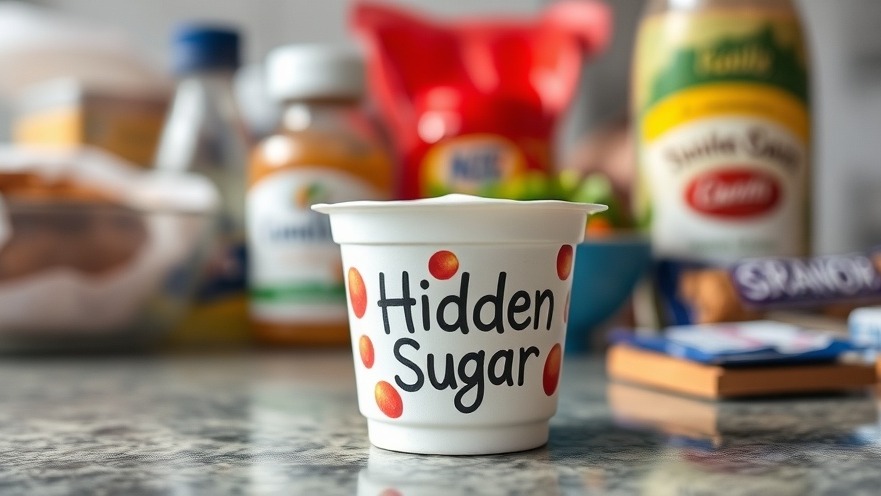
Protect Your Brainpower: The Sugar Connection Doctors Don’t Talk About
Most of us know sugar isn’t doing our waistlines any favors. It’s tied to weight gain, diabetes, and even heart disease.
But fewer people realize that sugar’s effects go far beyond the body—it can also shape the way our brain works, from how we think and focus to how we handle stress and emotion.
In Sacramento, where the pace of daily life can be demanding, this isn’t just a nutritional curiosity—it’s a wellness issue that affects work, family, and mental clarity.
Scientists are uncovering how sugar interacts with brain chemistry, and the findings should make us pause before reaching for that extra pastry or soda.
In 'Protect Your Brainpower: The Sugar Connection Doctors Don’t Talk About,' the discussion dives into the unexpected connections between sugar and cognitive health, exploring key insights that sparked deeper analysis on our end.
Sugar and the Brain: What Really Happens Inside
When we consume sugar, the brain lights up almost like it does with addictive substances. Dopamine, the “reward” neurotransmitter, spikes.
That’s why a candy bar can feel like an instant pick-me-up. But there’s a catch: those dopamine surges don’t last. Over time, the brain adapts and needs more sugar to get the same effect.
“High sugar diets can alter the brain’s reward system in ways that resemble drug addiction,” explains Dr. Nicole Avena, a neuroscientist at Mount Sinai School of Medicine and author of Why Diets Fail .
Beyond dopamine, sugar also fuels inflammation. Chronic inflammation has been linked to anxiety, depression, and long-term cognitive decline.
In fact, a large study in the Scientific Reports journal found that men who consumed more sugar had a higher risk of later developing common mental disorders .
For young people, this can be especially concerning. Developing brains are more sensitive to these chemical fluctuations, making excessive sugar intake a risk factor for poor attention spans and emotional regulation.
Why Mental Clarity Suffers
If you’ve ever felt the dreaded “sugar crash,” you’ve experienced this connection firsthand. A spike in blood sugar is quickly followed by a crash that leaves you foggy, irritable, and drained.
Dr. Uma Naidoo, a Harvard-trained psychiatrist and author of This Is Your Brain on Food, puts it simply: “What we eat directly affects the structure and function of our brain.
Diets high in refined sugar are harmful to brain function because they promote inflammation and oxidative stress” .
In Sacramento’s busy professional circles, that brain fog can impact productivity at work, concentration in school, and even patience in relationships.
What looks like a minor indulgence can, over time, ripple into serious effects on mental wellness.

Hidden Sugars: The Stealth Culprit
It’s not just about cookies and soda. Sugar hides in everyday foods—salad dressings, yogurt, bread, and even so-called “healthy” granola bars.
A single 5–6 oz flavored yogurt can contain as much or even more sugar than a glazed donut, depending on the brand . It’s easy to see how sugar sneaks into the diet without us realizing.
Nutritionist Julia Zumpano, RD, from the Cleveland Clinic, notes: “The average American consumes far more added sugar than recommended, often without realizing it. The problem isn’t just sweets—it’s the processed foods we don’t suspect” .
For reference, the American Heart Association recommends no more than about 25 grams of added sugar per day for women and children over two, and about 36 grams for most men .
Sacramento residents shopping at farmers’ markets in Midtown or Davis have a clear advantage: whole foods and fresh produce help cut down on these hidden sugars and naturally support better brain health.
Smarter Swaps: Finding Sweetness Without the Crash
The good news? Not all sweeteners affect the brain in the same way. Natural options like honey, maple syrup, or dates come with antioxidants and minerals that may help buffer sugar’s harsher effects.
Honey, for instance, contains polyphenols—plant compounds that may protect brain cells from oxidative damage .
But experts stress these are still added sugars, and moderation is key. “Think of these as bridges away from refined sugar, not free passes to consume as much as you like,” advises Dr. Naidoo.
Some Sacramento cafés are even beginning to offer lattes sweetened with date syrup instead of refined sugar, reflecting a growing trend toward healthier indulgences.
Food as Medicine: The Brain-Healthy Plate
Instead of focusing only on what to cut out, it’s more effective to focus on what to add in. A brain-healthy diet emphasizes:
Colorful fruits and vegetables – for antioxidants and vitamins
Omega-3 fatty acids (found in salmon, walnuts, flax) – for brain cell health
Whole grains – for steady energy release
Lean proteins – to support neurotransmitter production
Sacramento’s farm-to-fork culture makes this shift more accessible. Local farmers’ markets overflow with leafy greens, berries, and nuts—all proven to support brain function.
Choosing these foods helps reduce inflammation while also feeding the brain with essential nutrients.

Movement Matters: Exercise as a Sugar Buffer
Diet is only half the story. Physical activity also plays a major role in protecting the brain from sugar’s impact. Exercise increases insulin sensitivity, meaning the body can process sugar more efficiently, and it boosts endorphins, which stabilize mood.
“Exercise is one of the most powerful tools we have to reduce the effects of sugar on the brain,” says Dr. Fernando Gómez-Pinilla, a UCLA professor of neurosurgery and integrative biology.
“It enhances learning and memory while counteracting the damage from poor diet.”
In Sacramento, opportunities for movement are everywhere: jogs through McKinley Park, bike rides along the American River Parkway, or yoga in Capitol Park. These habits can offset sugar’s effects while providing a natural mental clarity boost.
The Long-Term Picture: Sugar and Cognitive Decline
Short-term crashes are inconvenient, but long-term effects are even more concerning. Research suggests that a diet high in added sugar is linked to poorer memory and greater risk of dementia, even in people who don’t have diabetes .
A 2013 study published in The New England Journal of Medicine found that higher blood sugar levels—even within the normal range—were associated with faster cognitive decline .
“Sugar doesn’t just affect today’s focus—it affects tomorrow’s brain health,” warns Dr. David Perlmutter, neurologist and author of Grain Brain.
“We’re talking about memory, decision-making, and overall cognitive resilience.” For Sacramento’s aging population, this is an urgent call to rethink dietary habits now, not later.
Community Resources and Support
The journey away from sugar doesn’t have to be solitary. Sacramento offers resources to help:
Local workshops on nutrition and wellness often run through health centers and community groups.
Mobile apps like MyFitnessPal or Yuka can help track sugar intake and identify hidden sugars in packaged foods.
Farmers’ markets in Midtown, Oak Park, and Davis give easy access to whole, unprocessed foods.
Fitness meet-ups along the river or in city parks provide social support for exercise habits.
When people approach brain health as a community effort, the changes feel less overwhelming and more empowering.
Protecting Your Brainpower
Sugar may taste sweet, but its hidden impact on the brain is sobering. From dopamine disruption to long-term risks of memory loss, the evidence is clear: excess sugar can rob us of mental clarity and resilience.
The solution isn’t about giving up all treats.
It’s about awareness, moderation, and smarter choices that protect both body and brain. By swapping refined sugar for natural options, embracing fresh local foods, moving our bodies, and staying connected to community resources, we can create lasting habits that fuel brain health.
In a city that thrives on creativity, innovation, and connection, Sacramento residents have every reason to protect their brainpower.
The effort pays off not just today but for years to come—because mental clarity, focus, and resilience are worth far more than any sugar high.
Continue your journey toward balance and wellness—discover more articles in Holistic Healing or return to the Sacramento Living Well homepage for more community stories.
---
Authored by the Sacramento Living Well Editorial Team — a publication of DSA Digital Media, dedicated to highlighting wellness, local living, and inspiring community stories throughout Greater Sacramento.
 Add Row
Add Row  Add
Add 





Write A Comment